Dengue on the rise in the northeast, wet season worries

As if you haven’t got enough to worry about. For now, Covid-19 is largely under control here in the Land of Smiles, but the annual worries around the wet season and Dengue Fever are an ongoing nuisance. Whilst Covid-19 is getting all the headlines, Dengue is a clear and present danger for anyone living in Thailand, especially at this time of the year. Zika Virus and Chikungunya Disease are also painful and potentially dangerous mosquito-borne diseases.
Along with the rainy season comes mosquitos, especially if you happen to live nearby a water source. Dengue fever is already causing problems in some provinces, with 15 people dead and currently 25,708 cases of the the fever for 2020. Isaan (Northeast Thailand) is the current hotspot for Dengue. The age range with the highest current dengue fever cases are firstly 15-24 years old, then 10-14 years old and 25-34 years old. Although there is a high proportion of the cases Isaan, there are cases across the nation.
Chaiyaphum province has the highest number of dengue fever followed by Rayong Province, Khon Kaen Province, Mae Hong Son Province, and Nakhon Ratchasima. Dengue fever cases are now expected to rise as the country enters into the depths of the annual wet season and dank pools of water attract the mosquitos to breed.
The Thai Department of Disease Control has sent out another warning for people living in Thailand to beware of mosquitoes and to take safety precautions to avoid mosquitos and help eliminate breeding opportunities. These simple 3 steps can help protect against more mosquitoes decreasing the risk of dengue fever, Zika Virus, Chikungunya Disease.
1. Clean around your home to avoid water collection where mosquitoes can lay eggs, including plastic waste where water can be trapped
2. Store water in a closed system where mosquitoes are unable to breed
3. Take steps to avoid being bitten by mosquitos. Thaiger Top 10 recommendations HERE.
There are no specific medications to treat dengue infection. If you think you may have dengue fever, you should use pain relievers with acetaminophen and avoid medicines with aspirin, which could make potential bleeding worse. You should also rest, drink plenty of fluids, and see your doctor or visit a clinic immediately.
A lot of Thailand is jungle. And the weather is mostly very humid. Mosquitoes thrive in both situations. You’re in their domain and they’re not going anywhere just because you want to live here or are on vacation. Aedes aegypti carry Dengue Fever which is very prevalent in South East Asian countries.
The symptoms of the fever include fever, headache, nausea, muscle pain, joint pain, and a skin rash appearing all over the body including the back. The incubation period can be 3-24 days after exposure to the mosquito carrying the dengue virus. In a small number of cases, the dengue fever develops into a severe hemorrhagic fever that results in bleeding, low blood platelets, and blood plasma leakage.
The use of ground-spray insecticides (fogging) to kill mosquitoes that spread Zika, Dengue, and Chikungunya viruses, is one part of an integrated mosquito management program.
Over time and repeated use, insecticide resistance can occur in mosquito populations. Provinces in Thailand use insecticides as part of a broad annual mitigation approach to help reduce the prevalence of mosquitos in at-risk areas.
Dengue is just one of the things people living in, and visiting Thailand, need to be vigilant about.
Latest Thailand News
Follow The Thaiger on Google News:


























